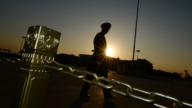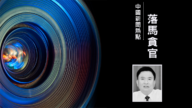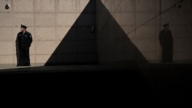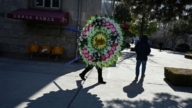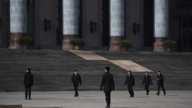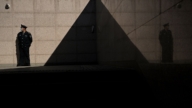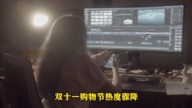【新唐人2012年12月28日訊】中共喉舌《新華社》刊發中共7名政治局常委的人物特稿,披露他們的工作、生活和家庭等信息,中共的專家解讀為,這是高層釋放改革的強烈信號,為中共官員財產公開作前期探索。但評論認為,人物特稿的內容都是歌功頌德,與官員財產公開及政治體制改革沒有任何關係。
12月23號開始連續3天,《新華社》刊發習近平、李克強、張德江、俞正聲、劉雲山、王岐山、張高麗等7名中共政治局常委的人物特稿,披露他們的生活經歷、施政理念、工作作風、甚至家庭情況和個人業餘愛好等。
中國歷史教授李元華指出,中共新領導班子上臺,為了顯示親民作風,有別於前任,而讓宣傳部門把他們塑造成普通人一樣,也是一步步走上來的。
中國歷史教授李元華:「因為這個在自由社會或正常社會,比如說家屬,本來就要公開的,他要選舉的時候,家裏的家屬實際上是要跟著一塊兒賣票的,要拉選票的,作為第二選民的,並不是說等你都走上位以後,才開始讓大家認識。」
李元華認為,7常委上位以後才讓民眾認識,已經沒有實際的作用,只是作秀。
美國「中國社會民主黨」中央委員會主持人劉因全:「我看了一下(特稿),基本上就是說他們多好、多麼親民、多麼廉潔、多麼正直,主要是歌功頌德,他們這樣做的目地,就是要繼續維持新班子的威信、樹立新班子的威信、維持共產黨的一黨專政的體制。」
中共黨校「黨建教研部」教授張希賢在接受《中新社》採訪時說,7常委公開自己的家庭情況,有利於推動各級官員逐步公開家庭情況,便於全黨、全社會在各層面進行監督,為今後的官員財產公開作出前期探索,同時是中共政治體制改革開啟的新一步。
美國「中國社會民主黨」中央委員會主持人劉因全指出,中共高層公布個人家庭情況,和官員財產公開及政治體制改革沒有任何關係。
劉因全:「我看到網上有流傳一個7常委的一個財產和房子的一個數字,只是銀行的一個存款數字,但是他們的其他財產……比如說子女配偶名下的財產,或者在其他方面的一些隱形財產,這個就很難查了。」
北京時政觀察人士華頗指出,中國民間呼籲官員財產公開已經很多年了,但是中共既得利益集團一直在阻礙。
北京時政觀察人士華頗:「隨著社會矛盾加劇,中共政權現在已經到了一個風雨飄搖的境界,所以萬不得已要把這個財產公開,但是這個也是風險非常大的,因為中國貧富差距實在是太大了,如果是他們的財產公布出來之後,老百姓看到官員財產那麼高,而自己生活這麼貧困,有可能對中共政權,中共執政合法性更不認可。」
華頗說,他們公布的只是能夠讓國民知道的,不能讓人們知道的絕對不會公開。
華頗:「比如說,有的常委的親屬是不是具有外籍,是不是國外生活工作,這方面他沒有公布,而且他的子女處在甚麼工作狀態,比如在國內是經商,還是在國外等等,都沒有說,只不過是…我出身於一個貧苦家庭,我的妻子已經退休,說的(只是)能說的,但不能說的,比如裸官這個,還是要隱秘的。」
李元華:「如果不是事實的話,也沒有人去監督他,去核實他這些東西,或者你真正要揭露他們的時候,你就可能被送到監獄裏面去了。」
李元華還指出,中共官員財產公開的規定很難落實,而且目前中共還在有意庇護裸官和貪官。他說,這次整頓「網路反腐」就是一個例子。
採訪編輯/李韻 後製/王明宇
Relationship Between Top Chinese Officials’ Family Affairs and Publicly Declaring Property
“Xinhua News Agency", the state-controlled station of the
Chinese Communist Party (CCP), published feature articles
about seven members of the Politburo Standing Committee,
in order to disclose their work, life and family.
CCP experts interpreted this as a strong signal of reform,
which took officials’ property as a preliminary exploration.
However, critics said that these feature articles
were only singing praise, and had nothing to do with officials’ declaring property or political reform.
From December 23 to 25, 2012, “Xinhua News
Agency” published feature articles on
the seven member Politburo Standing Committee
of the CCP.
These articles disclosed their life experiences,
policy philosophies, styles of work, and even family circumstances and personal hobbies.
Li Yuanhua, professor of Chinese history, pointed
out that the articles were from the publicity department.
Their aim is to mould the appearance
step by step into that of ordinary people.
It is to try and show that the new leaders
of the CCP are different from former leaders.
Li Yuanhua: “In a free society or normal
society, family members are openly seen.
During an election, the family members
have to work together to pull votes.
You cannot wait until you have taken position,
and then let people know who your family are.”
Li Yuanhua believes that there is no practical
value for the people to know them now. They are just putting on a show.
Liu Yinquan, moderator of the China Social
Democratic Party in the US: “I looked at these articles.
They mainly consist of praise, such as how good they are,
how close to people they are, how clean they are and how much integrity they possess.
It was done for one purpose. That is, to maintain the
prestige of the new team, to establish their credibility,
and to maintain the one-party rule of the CCP.”
Professor Zhang Xixian, of the CCP ‘Party Building,
Teaching and Research Department, commented
in an interview with Xinhua News Agency.
They were making initial explorations into public
officials at all levels, in order to disclose future property.
At the same time, they made a new step
towards reforming the political system.
Liu Yinquan, moderator of the “China Social
Democratic Party” in the US, commented.
Top levels of the CCP disclosing their family lives and
personal property has no bearing on political reform.
Liu Yinquan: “I saw online the houses and
saving accounts of the seven members.
But other properties, such as properties under
their children and spouses, or stealth properties and other assets, are difficult to check.”
Hua Po, current affairs observer in Beijing, points
out that the Chinese people have called for officials to declare their properties for many years.
However, groups with vested interests
in the CCP have been in the way.
Hua Po: “Social conflicts are growing.
Now the CCP has come to a precarious state, so publicly
declaring officials’ property has become its last resort.
They are forced to do so, but the risk is very big, as there
is a huge gap between the rich and the poor in China.
After their financial disclosure, people will see
officials as being so rich, and yet they have so little.
The Chinese people may not endorse
the CCP and its legitimacy of rule.”
Hua Po said that they only disclosed
what the Chinese people can accept.
What is not acceptable will not be revealed.
Hua Po: “For example, some relatives of the members
of the Standing Committee have a foreign nationality.
Some of them work in a foreign country.
He did not tell us what conditions his children
are in, for example, doing business, working in the country, or in a foreign country.
They only said that they grew up in
a poor family and their wife is a retiree.
However, being a naked official— whose family
is settled in a foreign country,
and only he is left behind with his job and
passport ready—is a top secret never to be told.”
Li Yuanhua: “If they lie, there is no one
to supervise him, or to verify these things.
If you want to expose their lies,
you would be sent to prison.”
Li Yuanhua also pointed out that it is difficult to
implement rules enforcing officials to declare properties.
The CCP still intends to shelter those
naked officials and corrupt officials.
Legislation of the Internet is a result
of “Internet anti-corruption".


